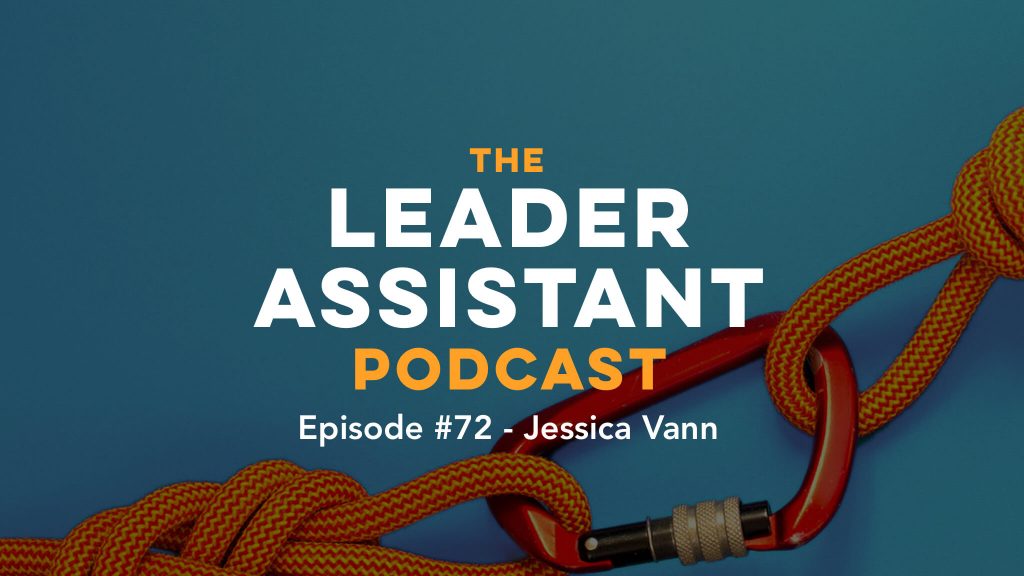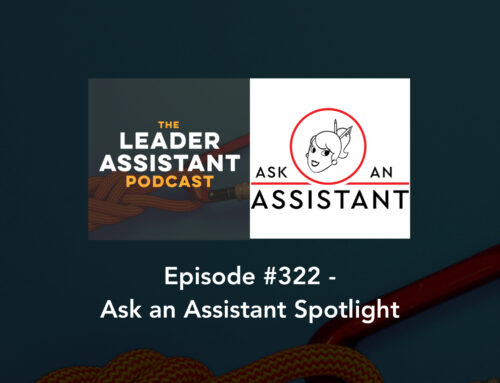Jessica Vann is the CEO and Founder of Maven Recruiting Group – a renowned recruiting brand specializing in connecting high-leverage executive assistant and operations hires to the nation’s most prominent executives and companies.

We talk about changing the perception of the executive assistant profession on both sides of the table, what executives look for in an assistant, tips for preparing for an interview, what NOT to say in an interview, and more.
SPONSOR FOR THIS EPISODE
Check out LifeSquire.com – an Assistant Resource Center focused on matching executives with assistants, and creating relationships – where both sides thrive. They would love to help you find the perfect job or work with you to enhance your skillset.
LEADER ASSISTANT MEMBERSHIP
Check out the Leader Assistant Membership for ongoing training, coaching, and community.
LEADERSHIP QUOTE
Train people well enough so they can leave, treat them well enough so they don’t want to.
– Richard Branson
CONNECT WITH JESSICA & MAVEN RECRUITING GROUP
ABOUT JESSICA
Born a trail blazer, Jessica Vann has founded and grown Maven Recruiting Group to a renowned recruiting brand, specializing in connecting high-leverage Executive Assistant and Operations hires to the nation’s most prominent executives and companies. Since its inception in 2010, Vann’s entrepreneurial spirit and leadership, in conjunction with the talented team she has assembled, have secured Maven’s spot as an industry leader, as evidenced in recognitions such as Inc Best Workplaces, Inc 5000 Fastest Growing Company, San Francisco Business Times Top 100 Woman Owned-Businesses, San Francisco Business Times Fastest Growing Private Companies and San Francisco Business Times 25 Largest Staffing Firms in the Bay Area.
As an active thought leader in the administrative support community, Vann hosts a podcast for executive assistants, REACH, and also contributes her honest and comical insights on the Mavenology blog and as a contributor to The Muse. Through these initiatives, Maven strives to bring awareness and recognition to the administrative community. Our goal is to empower EAs with the information and inspiration they need to create meaningful opportunities and value for themselves throughout their executive assistant careers.
A resource for both temporary and permanent hiring needs, Maven Recruiting Group provides talent to Fortune 500 companies, Venture Capital firms and growing tech startups. To contact Jessica, please email jvann@mavenrec.com.
THE LEADER ASSISTANT BOOK
Download the first 3 chapters of The Leader Assistant: Four Pillars of Game-Changing Assistant for FREE here or buy on Amazon here.
JOIN THE COMMUNITY
Join the Leader Assistant Slack Community here, or the Facebook Group here for bonus content and to network with other assistants who are committed to becoming leaders!
SUBSCRIBE
Subscribe to The Leader Assistant Podcast so you don’t miss new episodes!
You can find the show on Apple Podcasts, Spotify, Google Podcasts, Pandora, and Stitcher.
Join my email list here if you want to get an email when a new episode goes live.
LEAVE A REVIEW
If you’re enjoying the podcast, please take 2 minutes to rate and review the show on Apple Podcasts here. Each review helps me stay motivated to keep the show going!
—
EPISODE TRANSCRIPT
Jessica Vann 0:00
Hi, I’m Jessica Vann and today’s leadership quote comes from Richard Branson. Train people well enough so they can leave. Treat them well enough so they don’t want to.
Podcast Intro 0:12
The Leader Assistant Podcast exists to encourage and challenge assistants to become confident game changing leader assistance Welcome to Episode 72
Jeremy Burrows 0:27
Hey everyone. Thanks for tuning in. I’m excited to share today’s interview but first I wanted to share a quick note about this episode’s sponsor. Lifesquire is an assistant resource center focused on matching executives with assistance in creating relationships where both sides thrive. They would love to help you find the perfect job or work with you to enhance your skill set. Check them out at lifesquire.com/leaderassistant or call them at 405-889-4430 Again, lifesquire.com/leaderassistant. Also a quick note. So today I’m interviewing Jessica Vann from Maven recruiting group. And she interviewed me on her podcast for assistants called Reach. And you can find my interview on her show. It’s episode 20. So look up the reach podcast for assistants on Apple or Stitcher wherever you listen to podcasts. And look up episode 20. That’s my interview where I’m actually the interviewee for once, so you can check that out and subscribe to her show as well. Alright, let’s jump into today’s interview. Hey, everyone. Thanks for tuning in to The Leader Assistant Podcast. It’s your host, Jeremy Burrows. And today I’m speaking with Jessica Vann just co founded Maven recruiting group, a renowned recruiting brand specializing in connecting high leverage executive assistant and operations hires. Jessica, how’s it going?
Jessica Vann 2:16
It’s going well. Thank you, Jeremy, how about yourself?
Jeremy Burrows 2:20
Doing? Well. I’m excited to chat with you today. Tell us a little bit about Maven, recruiting. And you know who you guys are and what you do?
Jessica Vann 2:32
Yeah, so MAVEN is a recruiting firm that has specialized in placing executive assistants and operating staff, administrative assistants to really the the movers and shakers and some of the most illustrious companies, executives and brands. In both the Bay Area and beyond. We work with a number of different types of industries. And in addition to our work as a recruiting firm, and in addition to supporting the EA community for the last decade with with these types of searches and roles. We also have a podcast, and I host that and it’s a podcast that’s focused on again, really providing a resource for the EA community, and really helping to hopefully serve and inspire and guide them through pivotal moments in their careers.
Jeremy Burrows 3:33
That’s great. So why, and when did you decide to start Maven?
Jessica Vann 3:41
Well, the one is the easier part to answer. The one would have been, let’s say, we just celebrated our 10 year and well celebrated as a bit of an overstatement because we didn’t get to celebrate our 10 year, we made 10 years as a business, the celebration is yet to come. Unfortunately, the COVID crisis put a damper on all of our celebratory plans. But we look forward to all of the feathers and balloons and glitter and champagne that is in our future. But yeah, I started the company in March of 2010. And it was at really kind of the the, the bottom of what was then, I guess the last recession that we that we dealt with as a population. And everybody thought I was nuts, because who starts a business at the bottom of the recession. And also, unbeknownst to me, was pregnant with my first child at the time. So yet again, who starts a business when they’re pregnant and in a recession? Not not the best combination of factors. But so that’s the one the why I think there’s so many ways that I could answer that question. I think that for me You know, entrepreneurship isn’t so much a choice as it is a destiny. And I think that the circumstances of how I grew up and kind of seeing, you know, a mother toil endlessly in a job that just really kind of enslaved and dehumanized her was a very, was a very impressionable and formative experience for me. And I think that there was always this desire in me to not ever be at the beck and call of someone else, or to have to be to have to answer to someone else. I think because of that. But I think that, you know, fundamentally in me, as well, it was, was this desire to create and to feel like I could really express my voice and my point of view, in terms of how we operate in terms of, you know, creating the responsibility of creating the brand, the responsibility of driving value, and creating value for customers, and really figuring out how I wanted to show up as a, as a, as a service provider, as a partner. So just that, that whole opportunity to really influenced that and create something that that was reflective of me and my style, and ultimately, the broader company that that now is, is in existence, was really the the exciting opportunity here. And I think to like as an employer, you know, there was a real excitement and desire to create a company that really valued and acknowledged and supported the people within it. And so there’s a number of ways that we’ve been able to do that and, and evolve the employee experience that you know, that the people that will work at Maven have been that’s been equally as exciting as the, the fulfillment of, you know, growing this company and serving these CEOs and serving these executives and serving this community of executive assistant. And, you know, Jeremy, you, you serve the same community, right? I mean, you’ve done so much to really elevate the EA brand and really support your community. And I think that that’s been one of the really satisfying things of, of creating this company. And the other really satisfying thing is creating a place that people genuinely love to work at, and that people find a real sense of home and belonging in and a real sense of, of support and fulfillment. And figuring out how to do that for them, and how to reward them and show up for them has been the other part of this journey. That’s been really exciting. So yeah. Does that answer your question?
Jeremy Burrows 7:43
It does that.
Jessica Vann 7:44
Oh, did I answer it too much?
Jeremy Burrows 7:45
No, no, that’s great. I do have a couple of follow ups. Is there one, one or two tips? Or maybe is there one thing that you did that? You know, speaking of being in the recession, and we’re kind of in a crazy year and 2020? And is there something that you could share that you learned that EAS could kind of apply to their context? As far as you know, starting a business in the middle and the bottom of a recession?
Jessica Vann 8:18
Huh, yeah, I mean, I think it’s so in terms of applying that that story to an executive assistant audience. I think that what we’re fundamentally talking about whether you’re you’re talking about being an entrepreneur, or, you know, working for an executive, whatever your current your particular context might be, I think that I think that the the overarching thread that binds both of those, those, those two, those two things, is a belief that you will prevail. And I think that that’s the that’s the common ground. And I think that’s really what carried me through that time was that no matter how bizarre things might have been at the time, or how kind of, you know, discouraging, you could have have seen the circumstance, I think that it never rocked me. And I think that you know, whether you’re talking about being an entrepreneur or whether you’re talking about being executive assistant who’s stepping into a new role, or stepping outside of his or her comfort zone, to try something different, whether it’s a new executive or a new opportunity, or a new industry or a new what have you, I think that you’ve got to lead with conviction and you’ve got to lead with confidence and belief in yourself. And I you know, again, like it never really it didn’t rattle me. I just, I think I knew that that my fortitude would carry me through and I think I knew that If I showed up in an earnest and sincere way and did good work, and did good work by good people, that eventually it would it would sort of, you know, manifest, which is not to say that there were not a million, you know, challenging situations that happened along the way and discouraging moments, but over the overall theme was always that this will, this will come together.
Jeremy Burrows 10:26
And so interesting, because that’s really what makes executive assistant, a leader. And more effective is, you know, the top EAS in the world. They don’t get rattled when everything else falls apart. So it’s a similar skill set.
Jessica Vann 10:44
Yeah, yeah.
Jeremy Burrows 10:46
So what would be the other? Or my other follow up is, why assistants? Why did you decide you could have chosen to hold hundreds of different roles to start a recruiting group for? Why?
Jessica Vann 11:03
Well, let’s see. Salespeople talk to me now. I’m kidding. It’s hard, too much. They do though. And they’re squirrely, I love them. They’re great conversationalist. They’re great to have dinner with, but I don’t know that I want to deal with them all day long. Let’s see, you know, to be perfectly candid with you initially, it was it was coincidence. You know, I worked for another business, before launching my own company. And I that was where they had the opportunity. It was, okay, hey, we have an opening with our administrative team. So that’s what you’re going to do if you want to work here. And I said, Okay, great. I want to work here. So that’s what I’ll do. And so ultimately, that’s, you know, how I built my, my, my experience was, was because of that. And then I started, you know, really actually beginning to understand and appreciate and identify with this community. And I mean, I have to say, and you know, this, Jeremy, because I’ve also I’ve read your book, and obviously, you’re an assistant, yourself, and, you know, many, many assistants. So you know, I mean, these are some of the best stories you’re ever going to hear, right? Who tells a better story than an executive assistant, you know, talking about the time when X, Y and Z, right and how they were able just by the skin of their teeth to execute the impossible, right. So I think that I really, really jived with and really began to appreciate just the vibrance and vitality and charisma of this group of people and really also saw, and I think this is the other piece that really, you know, locked it for me is that there was a real opportunity to help elevate the perception of this of this group of people that oftentimes assistants would come in, and they would meet with us. And it was almost like they didn’t quite know how to own how instrumental they were. I think sometimes this this role appeals to a more humble type of person. Sometimes it’s somebody that’s less forward facing or less of a showman and a spotlight seeker. There’s certainly exceptions to that. But I think that oftentimes, there was this humility, where they really didn’t know how to advocate or didn’t always speak of themselves in the most complimentary of terms, and it was like, an opportunity both and how we worked with them, to really empower them and help them have these lightbulb moments in recognizing their own value, and how to speak to that value, which would ultimately help them drive career moves, drive compensation, drive, promotions, drive opportunity, right that that felt really good to be able to do that for people. And then on the other side, on the client side, it was a real opportunity as well to to educate and to say, hey, you know, what, you want to be this type of person you want to you want to perform it at this level, you know, on par with the the most efficient and effective and powerful executives out there. Well, this is how you need to do it. And you’re not really leveraging all of the resources available to you. And here’s how you can do this differently, and really turning on as well for them, their awareness of how they could operate differently to be more to be more accomplished and more successful. So it was really like a two fold thing of really being able to influence both sides of those because both sides of the table if you will to bring them together in a more complimentary way. That’s great. So and accountants I just, you know, I can’t
Jeremy Burrows 14:41
see like assistants. I do like assistants. So what are your clients look for in an assistant?
Jessica Vann 14:50
Yeah. A lot of things. So, you know, depending upon the client Um, people come to that conversation with a different level of preparation and different ideas, right? Some of them have been listening to their board, and they have it in their head that okay, well, you know, you’re gonna go public, and we’re gearing up for you to go public in a couple of years. So therefore, you need an assistant who’s navigated, you know, a pre IPO process, and been through rapid scaling, and this, that and the other and knows how to, you know, do the road shows, and this and that, and sometimes, you know, what people look for is actually ends up being really an iterative and kind of evolutionary process, right? It ends up being very dynamic, because sometimes it’s, you know, they, they come into the process with one thing in mind, like, like what I described, and through the course of the search, we realize that that’s really not what they need that, in fact, it’s much more driven by the intangibles, and that, you know, rather than the person that’s done, all of those things that will be determined or find out is that no, it’s actually the charisma and that kind of being in lockstep with somebody and having that kind of mind meld or, you know, being a finding an assistant who maybe he hasn’t done all of those things. But lo and behold, he or she is just, you know, gunning for an opportunity and just a total, you know, upstart whippersnapper and ready to throw themselves in to whatever and it’s kind of fearless. And we learn it, that’s what they need. Right? So. So I guess, just answer your question. It’s a it’s an iterative process of what someone needs. And it and it depends. And that’s part of the discovery that we go through, when we sit down with a client is let’s really dig in, and what do you think you need, but what do you actually need? What are your actual challenges when you actually struggling with what’s, you know, what, what what, what is your day to day look like, and what’s bogging you down? That being said, I think that there’s still some common threads that virtually all executives look for. And just off the top of my head, I would say those are things like loyalty. I think it’s very hard for an executive to feel comfortable. Partnering, going through all of the effort that it takes to build a relationship, right, being vulnerable, being open, sharing, investing in that, that, you know, that partnership, if they don’t feel like the assistant is someone that’s going to stick around. So I think somebody that that can demonstrate loyalty, and who values loyalty is super important. I think discretion is always a key one. Nobody wants an assistant who’s going to overshare or, you know, divulge too much. We touched on this a little bit earlier, but you know, that that kind of fortitude, and that sense of composure, no matter what the situation may be and the kind of person that doesn’t, that doesn’t add to the panic, but rather, you know, brings the brings the energy down when things get to escalated. What are some other things? I think a Oh, an ability to be really proactive and thoughtful. I think a helpful demeanor. So the kind of person that doesn’t greet, you know, requests or new tasks with a kind of like, sort of response, but rather was like, absolutely, you know, let’s let’s do this. So I think it’s an attitude thing. The ability to to be autonomous and to make autonomous decisions. I don’t know of any executive that wants to necessarily be a sounding board for every stage of your decision making. Right? They want you to come with solutions and come prepared. So I think the ability to process thoughtfully and independently is really important. Yeah, yeah. So no,
Jeremy Burrows 19:02
yeah. Sounds sounds familiar. So what about interviewing? What’s what’s one tip, as these EAS are going in, and they’re getting ready to interview with one of these executives that once all that stuff you just mentioned, and more? What’s what’s your number one, like? Crushing interview tip?
Jessica Vann 19:23
Hmm. I think that the preparation is always key. Know, this is not necessarily revolutionary, but it really is true. So I would I think that more often than not when a candidate doesn’t move forward in the interview process. Usually it’s because they weren’t they they somehow we’re not able to communicate their experience in a way that was compelling and that had resonance for the interviewer. So it’s not to say that they don’t have the experience. It’s not to say that they haven’t done those things. But maybe because of lack of preparation, maybe because of lack of confidence or conviction and how they spoke about it. It didn’t it didn’t hit. And so I would encourage those who are interviewing, to anticipate, you know, what are the scenarios that are likely going to be asked of me? How am I going to demonstrate, you know that I’m proactive? Not just say it, but how am I actually going to demonstrate it? What are the two examples I’m going to cite? To illustrate that? How am I going to demonstrate that I have the ability to remain calm in in in the storm and chaos? What are those examples going to be? And I really do a tribute. I mean, some people are just great at riffing in and pulling, you know, from thin air. But most of us aren’t right. And most of us would benefit from from that. So, as well, I would say that, you know, too many words, end up sounding unconfident. And I think that it’s very easy to lose your message. So I would encourage our, the people who are who are interviewing to not only prep those and plan ahead, but you know, roleplay it a little bit. Maybe write it out, but remember that it’s all about high information, to word ratio, right? fewer words, more information, and let’s just hit it on the head.
Jeremy Burrows 21:25
So are there any words that you can think of they’re like, don’t use these words, I can imagine, like, a list of words that are okay, generally, but they’re not very helpful, or they can kind of raise a red flag in the interview process. Like, like, example, might, I might personally think that I value my, you know, my family life and boundaries and work life balance and all that. But maybe using the word boundary, in an interview trigger something in an executive says, Oh, this guy doesn’t want to work.
Jessica Vann 22:05
Yeah. I mean, I think there’s, there’s different theories on that. Some people would argue that being really forthcoming with what you need, at some point, not necessarily in the first two minutes of the interview, right. But at some point in the interview process, over that courtship, right of 234 conversations, that you actually are forthcoming about, hey, I’m a father, I have two children. You know, these are my kind of parameters. And this is when I’m available, and then I take this break, because this is my family time, and this is my carve out and then I’m, and then I’m yours again. Right? So I actually do think that there’s merit and value in in speaking your truth and and what it is that you need to be fulfilled over the long term. Because, again, I think that goes back to, you’ll be more loyal. And you’ll be more invested if you’re actually, you know, entering into the partnership with the right understandings and mutual understandings. That being said, I think that there’s certain things that you know, just always don’t play well. Right. So any any kind of bad mouthing whatsoever of your former executive, regardless of how deserved or undeserved it might have been? It just it doesn’t doesn’t play? Well. I think that people want to know that you come to that you that you greet challenging situations with solutions as opposed to gossip. Right? So it’s like, Well, what did you do to evolve at a challenging situation as opposed to taking a resigned approach? Or even worse, just to kind of, you know, bad mouthing? That that doesn’t, that doesn’t land well. What else does not land well? I think having sort of flippant reasons for why you’ve left roles, I would really be thoughtful and how you communicate that, you know, especially if there’s, if there’s a lot of, of movement, I think that you really need to to anticipate that there’s going to be some pushback on that. And be really thoughtful about how you articulate that. If it sounds like someone’s the type of person that just kind of you know, throws in the towel when things get uncomfortable or challenging. Again, that’s going to be hard to rebound from. So just be mindful of kind of the, the, the messaging and and how you’re, you know, how you’re how you’re telling your story.
Jeremy Burrows 24:47
So, those are some great tips and a lot of that can kind of translate into not just in the interview but on your LinkedIn profile. or in your social media? What’s something that you would encourage assistants to stop doing as it relates to, you know, marketing themselves for a new role? And then what’s something you would encourage them to start doing?
Jessica Vann 25:15
Yeah. So on the stop doing side, sometimes people get, they go down the rabbit hole of wanting to create, like a really fancy resume that’s got colors and graphics, and and, you know, is is really unique in terms of how they display their experience, I would say that 99.9% of the clients prefer a much more kind of cut and dry format. And in fact, you know, as recruiters, that’s the first thing that we’ll ask you to do, if if you come in with something that’s got all kinds of, you know, bells and whistles, will ask you to just pare it back and kind of sanitize it, if you will. So I think that just, that is an important thing, just from a formatting perspective. As far as social media posturing, this is so so so, so important, I can’t underscore this enough. And yet, it continues to happen that, you know, there’s discrepancies in people’s stories. So if your resume does not align to the story that you’re conveying about yourself and your brand, in social media or through LinkedIn, you know, that’s going to be a red flag. More and more and more people are divulging and sharing more of their lives, through social media outlets, whether it’s blogging, or Instagram, or Facebook, or Twitter posts or what have you. And I just encourage everyone to know that whatever it is you’re putting out there is going to become part of your archive, and part of your personal directory. So it was not a statement one way or the other, except to say no, that that’s that that’s a fact. And so whatever you put out there, just know that that’s now going to enter into the ecosystem of information that this potential employer is going to use to evaluate you on. And is this In fact, you know, what you what you want out there? And if it is great, and if it’s not, you know, think twice? So yeah, I just, you know, we are we live in a very transparent time. So I guess that’s, that’s on the the stop doing part of the answer to your question, the start doing part. I would say that, I think more often than not, and this kind of goes back to what I was saying earlier, that sometimes it’s sort of the nature of the people in this role that that they undersell themselves. And so I can’t tell you how many times I’ve sat down with an amazing candidate who, you know, has accomplished so, so much. And looking at the resume, you wouldn’t, you wouldn’t get that, right. So what I would encourage is not just to sit down with your resume as kind of the static document, but I would encourage you to actually sit down with somebody who’s willing to listen and talk about what you’ve done. Talk about, how do you spend your time? What are the what are the problems that you’re solving on a daily, weekly, monthly, quarterly type of a basis? What are the situations that you find yourself in? Who are the people that you’re talking to and interfacing with? Because I think in breathing life into those moments and experiences, it will actually reveal the extent of what you do. And it’s so easy to just take for granted? Oh, well, I forgot that. Yeah. When I’m planning the board of directors meeting, and oh, my goodness, and the board of directors is, you know, this a list group of, you know, top 50. You know, fortune, what have you executives? Yeah, that’s a big deal. You know, but but maybe that person is taking it for granted that it’s just, it’s just sort of, you know, commonplace. And so they don’t think to mention it. So talk to somebody or talk to yourself or whatever. But I think through through the narrative, you might actually get more, you might find more things that you can talk about. So that’s one thought. I would also say and I promise this is not a shameless plug. But I would also say that it’s really valuable to connect with a good recruiter. And what I mean by that is that a good recruiter will act as a Lookingglass and help you really be healthy a mirror for for you, and will help but through through the questions that they ask you through the dialogue that they have with you through how they guide you through that Discovery Process of and probe you for what you really want and what’s really going to satisfy you, and what are the situations that you want to avoid and all of these things, you know, they’re going to help you arrive at a at a place where either you’re going to, you know, land the dream job, because they’ve now eliminated and helped you pare down positions and companies and executives that weren’t the right fit for you. Or they’re going to help you refine the picture of what you’re looking for. So you can go after that and be more clear and were directed, and how you approach your search process. So regardless of how you landed the job, I think that it’s a really valuable process to go through in in your discovery phase.
Jeremy Burrows 30:50
Love it. I’m over here taking notes. In case I need you this in the future. Well, Jessica, thank you so much. Let’s, let’s wrap things up with a question about you. What is one thing you want everyone to know about you?
Jessica Vann 31:08
Oh, boy, this was the hardest one to think about. So the best for last? Yeah. So um, so when I was 18? Well, yeah, graduating from high school. 1718, whatever it was. Our one of our teachers had us do this exercise where it was like, we were supposed to write a letter to our future selves, right. And then at our 10 year reunion, they were going to give them to us. And of course, by the time 10 years rolls around, you’ve long since forgotten, what and what in the world you wrote, what state of mind you were in what was going on with you, that’s all you know, that’s a bygone. And I almost didn’t even go to my 10 year reunion, to be honest with you, but I did. And at the end of the night, they handed us an envelope, and it had the letter in it. And of course, you know, I’d completely forgotten about it. So my best friend and I duck out and kind of go in and open up the letter and we’re, you know, skimming and eager to read and see what it is that we said to ourselves 10 years ago. And it was really kind of a cool moment for me and like one of those kind of surreal sort of full circle moments, because I basically mapped out my future. And I and I, and it was, it was kind of startling to see that I was, you know, yeah, there were some differences. But by and large, I was living the life that I had articulated for myself and said, I would achieve, you know, 10 years later. And it’s just interesting to know that you that, you know, that we’re kind of, in a weird way, like we’re already sort of formed, you know, and it’s weird to think that it’s 17 or 18, that, you know, you might have so much insight into yourself. But it was pretty cool to see that. And it was really a very affirming moment, I think to and in terms of thinking about the importance of, of affirming what it is that you want in terms of thinking about, you know, articulating and really being clear with yourself and your intentions and kind of how can you manifest things in your life. And so for me, it was a really a powerful moment in revealing that and so now, the letter lives on my desk. And so when you come into my office, it’s framed, and there it is. And for me, it’s it’s like it’s a statement about staying, you know, staying true to your desire and, and how to achieve what it is you truly want.
Jeremy Burrows 34:03
That’s awesome. Well, let’s, why don’t you share where we can find Maven and how EA is listening, if they’re interested in just learning more about what you’re up to? Or if they’re even looking for a job right now? Or think they might be looking for a job in the future near future? Where can they find what you’re up to? And how can they reach out to you?
Jessica Vann 34:27
Yeah, so a couple of ways. So of course, our website, www.Maven rec.com. You can find anything from contact information for how to reach out to us two links to the blog that we update and maintain two positions that we’re working on two case studies and examples of the types of roles and executives and companies that we support and work with. And if you are as you mentioned, can candidates seeking representation. Of course, we’d love to hear from you. And similarly, if you’re a client or you’re someone who’s looking for help with a hire, no matter how obtuse and challenging you think it might be, we’re up for the challenge. And we’d love to hear from you as well. And as well, we have a podcast. It’s called Reach. And it’s a podcast for executive assistants. So to the extent that you’re interested in hearing from others in our community and network, we’ve put together a lot of resources there as well to help guide executive assistants through what we think are likely to be the pivotal moments and challenges that they encounter in their careers as EAS. So we’d love for you to find us there too.
Jeremy Burrows 35:48
Yeah, and I’ll definitely post the link to the to your website and the Reach podcast as well. Definitely hop on whatever app you’re listening to this and and subscribe to the reach podcast as well. So thanks again, Jessica. Really appreciate it. Have a good one, and we’ll talk soon.
Jessica Vann 36:09
Thank you, Jeremy. Thank you for having me as a guest and I really appreciate the opportunity.
Jeremy Burrows 36:15
Thanks again, Jessica. Thank you to life squire for sponsoring. Check out this episode’s show notes at leaderassistant.com/72.
Speaker 2 36:38
You on Apple podcast goburrows.com






